Could Vietnam dethrone Indonesia as the regional power of Southeast Asia in the near future?
越南能否在不久的将来取代印度尼西亚,成为东南亚地区的霸主?
以下是Quora网友的评论:
James Wu
I will answer this from the perspective of a Singaporean, a fellow Southeast Asian.
The phrase “regional power of Southeast Asia” is rendered somewhat meaningless by geographical realities. Southeast Asia is not an organic region. It is very clearly disaggregated into 2 components: mainland SEA and maritime SEA
The old name for mainland Southeast Asia is Indochina (the French used this term to refer to their colonies but originally it referred to the entire mainland), which makes sense because the states here are located at the crossroads of Chinese and Indian political/economic/cultural influence.
我就从一个新加坡人,一个东南亚同胞的角度来回答这个问题吧。
“东南亚地区强国”这一说法在地理现况下显得毫无意义。东南亚并不是铁板一块,而是明显地分为两个部分:陆上东南亚和海上东南亚。
陆上东南亚之前叫做印度(法国人就用这个词来代指法国殖民地,但最初它指代的就是整块大陆),这是很有道理的,因为这个地区的国家位于中国和印度政治/经济/文化影响的十字路口。
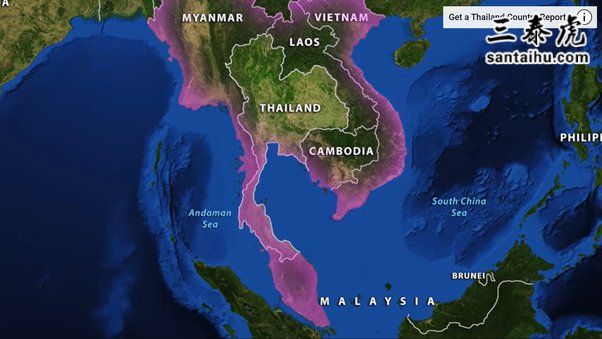
The old name for maritime Southeast Asia is the Malay Archipelago, or Nusantara. It contains a number of key maritime trade routes and chokepoints which became increasingly salient from the begng of the Age of Sail.
海上东南亚之前叫做马来群岛,或努桑塔拉,包含了许多重要的海上贸易路线和阻塞点,从航海时代起地位就越来越重要。
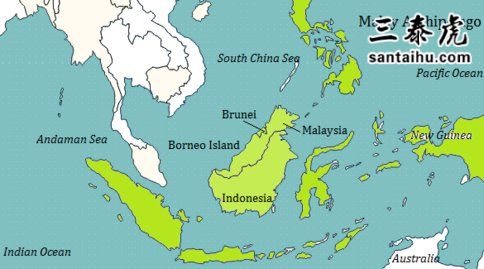
Mainland and maritime Southeast Asia are divided by two seas: the Andaman Sea (which narrows into the strait of Malacca) and the South China Sea
陆上东南亚和海上东南亚被两个大洋区隔开来:安达曼海(马六甲海峡是最狭窄的地区)和中国南海。
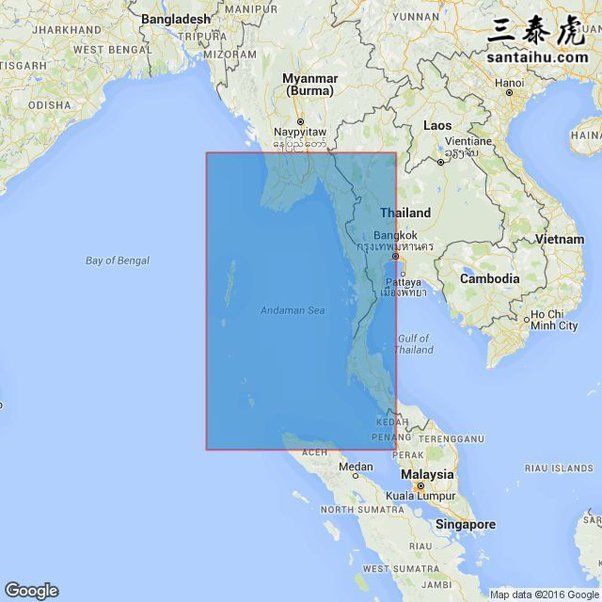
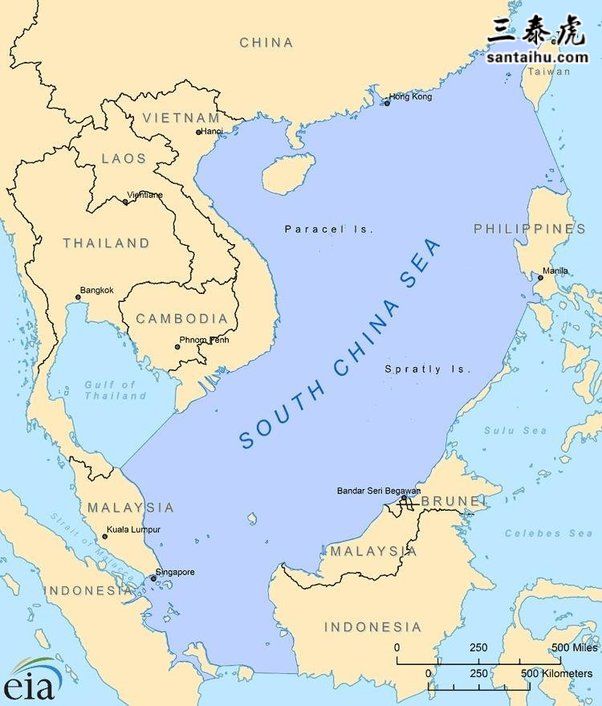
What this means is that any Southeast Asian regional power, to attain hegemony over the ENTIRE region, must project their power over these substantial bodies of water. I cannot imagine either Indonesia or Vietnam doing this for the foreseeable future (China is a different matter but we will exclude it from this discussion since it is not, strictly speaking, part of Southeast Asia). Hence, hegemony can only be partial.
这意味着,任何东南亚大国要想在这个地区掌握霸权,就必须在这些大片水域上部署军事力量。我无法想象印度尼西亚或越南在可预见的未来能有这种实力(中国不一样,但我们不讨论,因为严格来说,中国并不属于东南亚)。所以,这种霸权只能是局部的。
Moreover, Vietnam and Indonesia’s considerable geopolitical strengths are counterbalanced by significant geopolitical challenges which pose difficulties for each of them attaining regional preeminence.
另外,越南和印度尼西亚有不少地缘政治优势被地缘政治面临的挑战抵消了,使得他们很难获得地区优势。
In terms of demography, Indonesia has the largest population of the maritime SEA states; likewise Vietnam has the largest population on the mainland. Human resources are important: not just in terms of manpower for labor-intensive agricultural or manufacturing jobs but also in terms of generating intellectual capital and innovative ideas in a knowledge-based society and economy. You need people to build stuff, invent stuff, grow stuff, run stuff, etc. Indonesia’s population far outstrips that of all the other Southeast Asian states, dwarfing that of Vietnam by a factor of about 2.5. Hence it is fair to say that Indonesia has the greatest POTENTIAL of all the Southeast Asian states.
就人口而言,印度尼西亚是海上东南亚地区人口最多的国家;
同样,越南是陆上东南亚地区人口最多的国家。
人力资源是非常重要的:不仅能为劳动密集型农业或制造业提供人力,还能为以知识为基础的社会和经济创造智力资本和创新思想。
国家需要人力来建造东西、发明东西、种植东西、经营东西等等。
印度尼西亚的人口远超其他东南亚国家,是越南人口的2.5倍。
因此,我们有理由说印度尼西亚在所有东南亚国家中最有潜力。
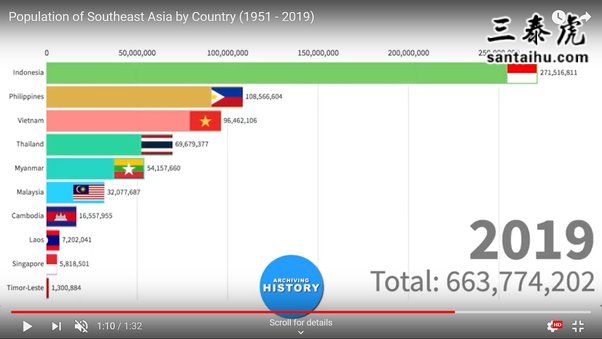
Culturally, Vietnam has an advantage (somewhat akin to that of China) because of its ethnic and religious uniformity. The ethnic Kinh, or the Viet people, comprise an overwhelming 85.7% of the population, and most are secular/atheist. A predominant cultural mindset/values, shared historical background and standardized/mutually intelligible linguistic framework is highly conducive to national unity and social cohesion.
在文化上,越南有一个优势(和中国有相似之处),越南的族群和宗教很统一。
京族,又称越南人,占到越南总人口的85.7%,大多都是世俗的无神论者。
越南人有一致的文化理念/价值观、共同的历史背景和相互理解的语言结构非常有利于民族团结和社会凝聚力。
Indonesia is slightly disadvantaged here. The majority Javanese only make up about 40% of the population, with the rest being segmented into a multiplicity of ethnic minorities. This presents difficulties for national integration, as Indonesian leaders like Sukarno found out in the early years of independence, when ethnic secessionist movements and rebellions erupted all across the archipelago and had to be put down by the TNI. Then again, an overwhelming 87% of Indonesians are Muslim, so Islam might constitute a centripetal unifying force in the construction of national identity. (although if I am not wrong, the Islam practiced in Indonesia tends to be more syncretic and pluralistic than the stricter “orthodox” Arabized version of Islam practiced in the Middle East).
印度尼西亚在这方面稍显劣势。主要人口爪哇族也只占总人口的40%左右,其他大多是少数族群。这给民族融合带来了一定难度。
苏加诺等印度尼西亚领导人在独立初期就意识到这个问题,群岛各处都爆发了民族分离主义运动和叛乱,不得不派出印度尼西亚国民军进行镇压。
但87%的印度尼西亚人是MSL,因此YSL教可能会在构建国家认同时形成一股向心力。
(如果我没记错的话,印度尼西亚的YSL教比中东地区严格“正统”的阿拉伯化YSL教多了一些融合和多元的因素)。
Economically, Indonesia is in the lead by far. The IMF graph below does not adequately reflect this, but in absolute terms, Indonesia’s GDP is about 4 times that of Vietnam.
Indonesia’s economy started off as largely reliant on the primary sector i.e. resource extraction like agriculture, mining, oil production etc. The vast resource endowments and natural wealth of the massive archipelago undoubtedly grants it an advantage in this aspect. But from the 1960s onward under Suharto, the Father of Development, it really industrialized and its growth took off spectacularly. Today it is still in the midst of transitioning away from the secondary sector (manufacturing) toward the tertiary one (services). It no longer relies as much on resource extraction for wealth, which is good.
在经济方面,印度尼西亚遥遥领先。国际货币基金组织下面的图表并未充分反映出这一点,但按绝对值计算,印度尼西亚的GDP大约是越南的4倍之多。
印度尼西亚经济最初主要依赖于第一产业,即农业、采矿、石油生产等资源的开采。这个庞大群岛的丰富资源和自然财富无疑使它在这方面占尽优势。
但从20世纪60年代开始,在苏哈托——“发展之父”的领导下,印度尼西亚真正实现了工业化,经济一飞冲天。
今天,印度尼西亚还处于从第二产业(制造业)向第三产业(服务业)转型的过程中,已不再那么依赖资源开采来获取财富,这是件好事。
Vietnam’s lagging GDP is understandable because it was slightly late to the economic development game, having lost a few decades under the stifling command economy, and before that, being embroiled in 30 years of continuous war. It only embraced the free market around the 1990s, when the Doi Moi reforms were implemented. Vietnam is currently in a similar stage of development as Indonesia, transitioning from the secondary to tertiary sector, but still lagging behind somewhat. The primary sector (Agriculture + Others) remains a relatively larger part of GDP than Indonesia, meaning Vietnam is still industrializing.
越南GDP的落后是可以理解的,因为它起步稍晚,在计划经济体制下浪费了几十年时间,在那之前还卷入了持续30年的战争。
越南在20世纪90年代左右才实施改革开放,开始拥有自由市场。越南目前正处于与印度尼西亚相似的发展阶段,即从第二产业向第三产业过渡,但还是稍显落后。
越南第一产业(农业+其他)占GDP的比重仍高于印度尼西亚,这意味着越南还处在工业化进程中。
Militarily, qualitative assessments of military strength are just as important as quantitative assessments. Both are pretty formidable, but in different ways. Having mentioned the relative importance of land power and sea power in mainland and maritime SEA earlier, it makes sense that Vietnam has a comparatively larger army and Indonesia has a comparatively larger navy. This is due to divergence of geostrategic focus.
在军事方面,对军事实力的质与量的评估都很重要。这两个国家都不好对付,但强项不一样。前文提到过陆上东南亚和海上东南亚的陆军力量和海军力量的重要性,所以越南拥有较大规模的陆军,印度尼西亚拥有较大规模的海军。这是因为地缘战略侧重点不同。
The Vietnamese army is battle-hardened: for 3 consecutive decades from about 1945 to 1975, Vietnam had known no other experience but war. Its army had fought four Great Powers (Imperial Japan, France, the US, and China) to win and preserve its independence. In the course of the three Indochina Wars, it had access to and experience handling Soviet, American, and Chinese military hardware and equipment. I can say with moderate confidence that of all the Southeast Asian countries, Vietnam has THE most well-tested and robust military capabilities, ranging from small-scale guerrilla warfare to regular conventional operations, hence the well-deserved title “the Prussians of Asia”. In the mid-to-late 1970s the great fear was that the Vietnamese army, after taking Cambodia, would overrun Thailand and the rest of mainland Southeast Asia. Vietnam alone in Southeast Asia has tasted war, endured its lessons, and, to a significant degree, mastered its practice. As they say, experience is the best teacher. It is militarily well prepared to repulse and defend against threats from potential Great Power adversaries (China), or to project power offensively against its slightly weaker mainland Southeast Asian neighbors. In short, its well-honed military’s function is external.
越南军队久经沙场考验:从1945年到1975年的连续30年里,越南除了战争没干过其他事。
越南军队和四个大国(日本帝国、法国、美国和中国)都打过仗,越南赢得了胜利,保持了国家独立。
在三次印度战争中,越南获得了对付苏联、美国和中国武器装备的机会和经验。
我可以自信地说,在所有东南亚国家中,越南从小规模游击战到常规作战的军事能力都是最久经考验、也最强大的,因此被称为“亚洲的普鲁士人”。
在20世纪70年代中后期,人们非常担心越南军队会在占领柬埔寨后继续攻占泰国和东南亚大陆的其他地区。
东南亚各国中,只有越南经历过战争,吸取过战争的教训,并在战场上所向披靡。
俗话说,经验是最好的老师。越南在军事上做了充分准备,可以击退和防御潜在大国对手的威胁,或者向较弱的东南亚邻国大陆展示军事实力。
简而言之,越南军队的职责主要就是对付外敌。
In comparison, Indonesia’s military has fulfilled a function that is mostly internal. The TNI’s main expertise and mission has always been the quelling of regional unrest or rebellions mostly within the operational reach of its amphibious capability. The army has mostly been used to reimpose domestic order by force. As such I would imagine it specializes more in counterinsurgency and stabilization operations.
Finally, a geographical analysis of both Vietnam and Indonesia reveals that both face significant constraints.
相比之下,印度尼西亚军队的职责主要是对付内乱。印度尼西亚国民军的专长和任务一直是用其两栖作战能力平息地区动乱或叛乱。
国家运用军队的武力来恢复国内秩序。因此,我认为印度尼西亚的军队更擅长平定叛乱和维*行动。
最后,对越南和印度尼西亚的地理分析说明这两个国家都面临着重大的桎梏。
In Vietnam’s case, it possesses a tremendous geographic advantage in the form of not one (Thailand only has one) but two territorial-population “cores”: the Red River Delta in the north and the Mekong River Delta in the south, both of which are highly productive in terms of their agricultural output, and commercially vital in terms of their access to seaborne and coastal trade. Both river deltas are lowland plains, meaning that they are highly conducive to military consolidation and political centralization as well. The Red River Delta is well shielded by mountains and jungles, rendering it defensible against invasion from the north.
以越南为例,它拥有巨大的地理优势,越南的地区人口“中心”不止一个(泰国只有一个),而是有两个:北部的红河三角洲和南部的湄公河三角洲,这两个地区的农业产量都很高,而且在海上和沿海贸易方面具有重要的商业意义。这两个河流三角洲都是低地平原,这意味着它们有助于军事兼并和政治集中。红河三角洲被山脉和丛林重重包围,可以抵御来自北方的入侵。
What about Indonesia’s geography? The first thing that stands out is its size. Indonesia is very clearly and indisputably the largest member of ASEAN, meaning that it can likely support a population to match that size. Moreover Indonesia’s islands are endowed with an abundance of natural resources which can be transmuted into wealth: tin, oil, natural gas, copper, and spices. In the early years of development this fuelled a burgeoning primary-sector economy.
印度尼西亚的地理环境怎么样呢?首先印度尼西亚的国土面积很大。毫无争议,印度尼西亚是东盟最大的成员国,这意味着它可以养活与之规模相当的人口。此外,印度尼西亚的岛屿拥有丰富的自然资源,这些资源可以转化为财富:锡、石油、天然气、铜和香料。早些年,这些资源推动了第一产业的蓬勃发展。
So, what this all means, in geopolitical terms, is that Vietnam and Indonesia, if they achieve pre-eminence, will do so in their SEPARATE spheres of influence. And these spheres of influence are unlikely to encompass the whole of the mainland or maritime realms respectively, but only a PART thereof.
In any case, I do not think either Indonesia or Vietnam are close to achieving such a sphere of influence in the foreseeable future. Neither are likely to become pseudo-hegemons in the respective mainland and maritime subregions, much less become the sole hegemon of Southeast Asia.
所以,从地缘政治的角度来看,这一切就意味着如果越南和印度尼西亚取得卓越成就,它们会在各自的势力范围内拥有举足轻重的地位。他们的势力范围不太可能覆盖整个陆上东南亚或海上东南亚,只可能是其中的部分地区。
不管怎么说,我认为印度尼西亚或越南都无法在可预见的未来攫取这种势力范围。两国都不太可能成为各自陆上和海上二级地区的伪霸权国家,更不用说成为东南亚的唯一霸权国家了
此文由 三泰虎 编辑,未经允许不得转载!:首页 > 问答 » 越南能否在不久的将来取代印尼,成为东南亚地区的霸主
 越南人如何看待被法国殖民的历史
越南人如何看待被法国殖民的历史 中国面积近1000万平方公里,只有56个民族,而越南这种弹丸小国居然有54个民族,这正常吗
中国面积近1000万平方公里,只有56个民族,而越南这种弹丸小国居然有54个民族,这正常吗 哪个国家和中国更像,越南、韩国还是日本
哪个国家和中国更像,越南、韩国还是日本 为什么华裔商人在东南亚比印度裔商人更成功
为什么华裔商人在东南亚比印度裔商人更成功 为什么越南现在还很贫穷
为什么越南现在还很贫穷 为什么越南看起来比印度现代化和发达得多
为什么越南看起来比印度现代化和发达得多 与日本洽谈许久后,为什么越南现在又想让中国修建高铁了
与日本洽谈许久后,为什么越南现在又想让中国修建高铁了 为什么越南如此幸运,传承到了中国文化,为什么菲律宾没能传承到中国的文化
为什么越南如此幸运,传承到了中国文化,为什么菲律宾没能传承到中国的文化